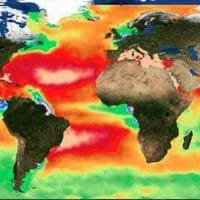-
Against advertising
Advertising is a constant feature of our everyday lives. John Molyneux argues that as a result, we often ignore its real and unsavoury function: capitalist propaganda par excellence.
-
Greta Thunberg champions the plight of climate refugees
“Climate crisis could displace 1.2 billion people by 2050,” says Greta Thunberg
-
The revolutionary answers of C.L.R. James
The Black Lives Matter movement across the U.S. against police violence and racist inequality is one of the most dynamic political developments in years.
-
Contemporary relevance of Marxian economics
My goal is to write a textbook that can fulfill two purposes: first, a stand-alone book for courses that are focused on Marxian economics or survey courses that have a section devoted to Marxian economics; second, it will also be useful as a companion text in a course that is based on reading all of or major selections from Karl Marx’s Capital.
-
1987: Ernest Mandel – On the potential of history
For a materialist conception of history, it is necessary to understand that the world cannot be consciously changed without understanding it correctly.
-
The interconnectedness of everything-Capitalist contradictions and Marx’s metabolic rift theory
No person is an island. It takes a village. Circle of Life. We are stardust. Seven generations. These truisms reference connections between people and what we owe each other. Appealing to chaos theory, an action, no matter how small, dominoes around the world.
-
Not just an orchard, not merely a field, we demand the whole World
When news of the revolution in the Tsar’s empire filtered into British-dominated India in 1917-1918, the reception was universal: if they could overthrow the Tsar, then we can overthrow the British Raj.
-
Nobel prize-winning economics of climate change is misleading and dangerous – here’s why
While climate scientists warn that climate change could be catastrophic, economists such as 2018 Nobel prize winner William Nordhaus assert that it will be nowhere near as damaging.
-
How the middle half lives
A Review of David Roedeger’s book The Sinking Middle Class: A Political History
-
Extinction Rebellion: The real criminals sit in parliament!
We applaud the successful blockades of a number of printing plants by activists of Extinction Rebellion. They have managed to seriously disrupt one of the key pillars of capitalism–the establishment press. Predictably, the Daily Mail, The Times and all the other right wing rags are complaining about this being an “attack on the freedom of the press”. A ludicrous charge.
-
Triple crisis in the Anthropocene Ocean
Scientists call them a ‘deadly trio.’ If acidification, oxygen loss, and overheating are not ended soon, a massive die-off of ocean life may be unstoppable.
-
Remembering comrade and leftist academic David Graeber
His death was sudden and a shock to his students and the scores of people influenced by his ideas. In a world where most academics value theorizing over activism and choose to abstain from public protest, Graeber was vocal about his anti-capitalist and anti-imperialist views.
-
Jade, For Hire! – “The Case of the Wrinkled Egg“
Tales of The Resistance – Episode 5 : Jade, For Hire! – The Case of the Wrinkled Egg The continuing story of “Jade, For Hire!”
-
If humanity is to have any future at all
The history of capitalism as a world system is punctuated by struggles for world hegemony between declining hegemonic powers and rising states, usually leading to world wars. We are now in such a period, which had been building for some time under Obama and is now being pursued much more openly and belligerently under Trump.
-
First-ever U.S. Space Force doctrine calls for space supremacy, further militarism
U.S. Space Command was created in 1985 by U.S. President Ronald Reagan to manage the “Star Wars” program: a U.S. Cold War plan to use space supremacy to menace the Soviet Union with orbiting battle platforms, powered by nuclear reactors and loaded with space-based weaponry like hypervelocity guns, particle beams and lasers.
-
Six complexities of these pandemic times
Social media, in March 2020, was awash with rumours. Swans and dolphins could be seen in totally deserted Venetian canals. A group of elephants marched into a village in Yunnan (China), drank corn wine, and went to sleep in a tea garden.
-
Celebrating the Life of Samir Amin
For Samir Amin’s anniversary on Sept 4, Global University for Sustainability invited Samir’s friends to reminisce their interactions with Samir and celebrate the very rich life that Samir lived.
-
In Defence of Hegel
Georg Wilhelm Friedrich Hegel was born 250 years ago, on 27 August 1770. A towering genius with an encyclopaedic mind, Hegel revolutionised every field that he dedicated himself to. As Marxists, we owe him a tremendous debt.
-
Essays in memory of Immanuel Wallerstein (1930-2019)
‘Once they are taken to be ideas about a historical world-system, whose development itself involves “underdevelopment,” indeed is based on it, [Marx’s theses] are not only valid, but they are revolutionary as well.’
-
Two faces of time in the modern era—Immanuel Wallerstein and his intervention on the issue of cultures in conflicts
By redefining a range of categories, Wallerstein seeks to reconstruct the scenario of the world, using a kind of political economy of culture to replace various Enlightenment thoughts—the presuppositions of various social sciences and their classification systems.




![I’ve just signed a contract with Polity Press to write a new book, “Marxian Economics: An Introduction.” The idea is to publish it in late 2021 or early 2022. - David F. Ruccio (Photo: [ht: adm])](https://mronline.org/wp-content/uploads/2020/09/exupl4jvcamiifh-copy-200x200.jpg)















